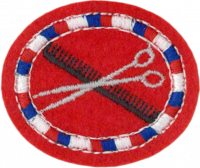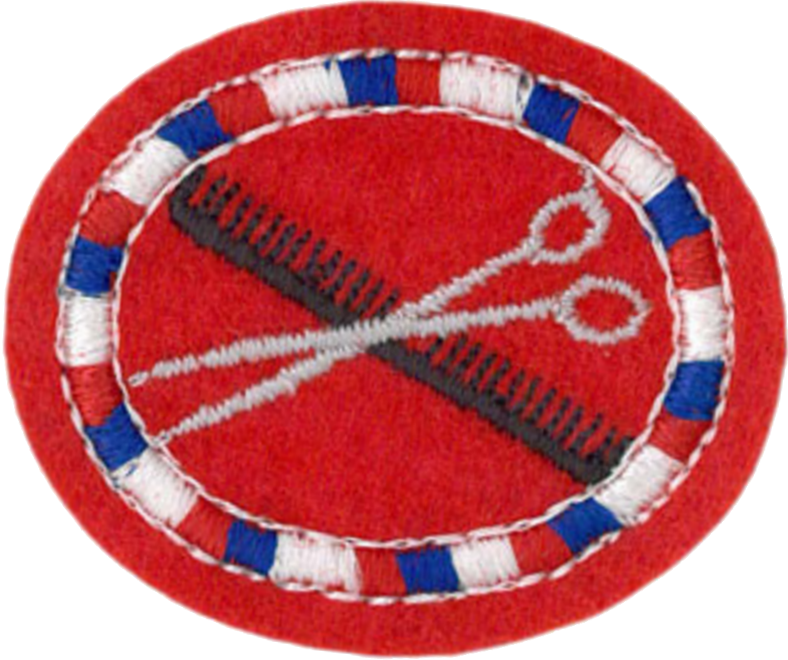Difference between revisions of "AY Honors/Barbering and Hairstyling/Answer Key"
(Marked this version for translation) |
m (- Category of AYHAB) |
||
| Line 133: | Line 133: | ||
==References== <!--T:26--> | ==References== <!--T:26--> | ||
<noinclude></translate></noinclude> | <noinclude></translate></noinclude> | ||
| − | |||
{{CloseHonorPage}} | {{CloseHonorPage}} | ||
Latest revision as of 18:53, 13 July 2022
Skill Level
3
Year
1938
Version
05.02.2026
Approval authority
General Conference
1
Start by asking permission to job shadow a barber or hairstylist for the day or a couple hours over several days.
During this exercise you should be able to learn the answers to the other requirements and demonstrate the required skills. Most barbers and hairstylists like to talk and will be happy to explain what they do and how they do it.
This honor will not make you into a barber or hairstylist (that takes weeks or months of school) but you should learn about the tools of the trade and gain an appreciation for this technical occupation that helps us all stay looking well groomed.
2
- . Washing
- . Combing or Brushing
- . Regular cut or trim
3
You will probably want to bring a friend/victim for this exercise. Perhaps another Pathfinder working on the honor so you can shampoo each other. The barber can judge the correctness of the shampoo job.
- Soak the hair, first. It's important that the hair is wet to make shampooing easy otherwise it won't work. Use warm or cold water.
- Massage the scalp. Petrissage is a scalp massaging technique to stimulate blood-flow to the scalp encouraging healthy hair and scalp, it also removes dirt.
- Shampoo your hair. Hair usually only needs one or two applications of shampoo. More than this can lead to static or fly-away results and leave the hair unprotected. If the first shampoo application doesn't lather, rinse, then shampoo a second time.
- Rinse your hair. It's important to ensure that no shampoo residue remains as this can dry the scalp out and create a flaky itchy scalp, it also leaves a greasy film
- Add conditioner. Gently squeeze the water out of your hair. Distribute the conditioner evenly through the hair using only your fingers. Never use a comb in the shower. It will pull on your hair and create more breakages in the long run.
- Rinse, Again. Rinse the hair thoroughly ensuring no residue is left behind. To finish use cold water which will close the cuticles, resulting in shine and give your hair bounce.
- Thoroughly dry your hair. When towel-drying never rub the hair as this will cause tangling and damage the cuticle of the hair. Air drying is better because blow dryers dry out your hair.
- Style the hair with gel or proceed to cutting.
4
You should not need to actually give a full haircut, although you may feel confident to give a simple cut as a beginner. Bring your own volunteers or use practice heads from a hairstyling school.
5
A comb is a toothed device used for styling, cleaning and managing hair and scalp. Combs are among the oldest tools found by archaeologists, having been discovered in very refined forms from settlements dating back to 5,000 years ago in Persia.
There are many types of hair combs on the market today.
- Wide tooth combs are best for getting out tangles.
- Fine tooth combs help get the hairs all in place. You may wish to begin with a wide tooth and then finish up with the fine tooth model.
- Rat Tail Comb - You might think that the rat tail is simply a comb with a handle, but the tail is actually designed to help get parts straight. Use the handle portion of the “rat tail” to run across the area you wish to part.
- A Pin Tail comb allows for precise parting. It is also a good tool for men straightening their hair with a flat iron because it can work with one particular section without leaving stray hairs. It also keeps you from accidentally poking your scalp. The pin tail comb allows for precision work, such as adding a streak of color.
- Barber Combs allow the barber to cut and trim without getting too close to the head, kind of like the guards on an electric clipper. Barber combs are tapered to provide a lot of different options.
- The Rake comb resembles a garden rake. It is very good for untangling long hair.
- Teasing Comb are used to add some texture and body. The teasing comb is used by taking a strand of hairs and holding them straight up. Run the teasing tool from six to ten times through the hairs. Do this with as many strands as you like. You should have a fairly long hairstyle for this to be most effective.
Condensed from this site where you can find comb photos.
6
Thinning Shear, also know as Texturizing Shears or Chunking Shears, are used to remove “bulk” from the hair without altering the hairstyle. Thinning Shears have “teeth” as opposed to “blades” and remove less hair with a single snip.
Yoko Scissors come in a variety of forms but they generally are manufactured from premium Japanese Hitachi steel. Yoko scissors allow smooth cutting with a very slim blade and specially designed thumb rings. They are well balanced. Some examples [1]
Toshiba Scissors are handcrafted professional hairdressing scissors from Japan. Toshiba scissors have a bent thumb ring to make them more ergonomic, so that your thumb sits at a more natural angle.
7
Clippers can be used to trim and shape beards as well as cleaning up the back of the neck. With an attachment, clippers are used to do buzz cuts or just to achieve uniform short length.
8
This short report should cover the required knowledge in the honor and other things you learned. What is it like to be in hair care? What did you learn from the person you job shadowed?
Historical Notes
This is one of the older honors available. It was called antique and then discontinued with the other vocational honors before being returned to active.


